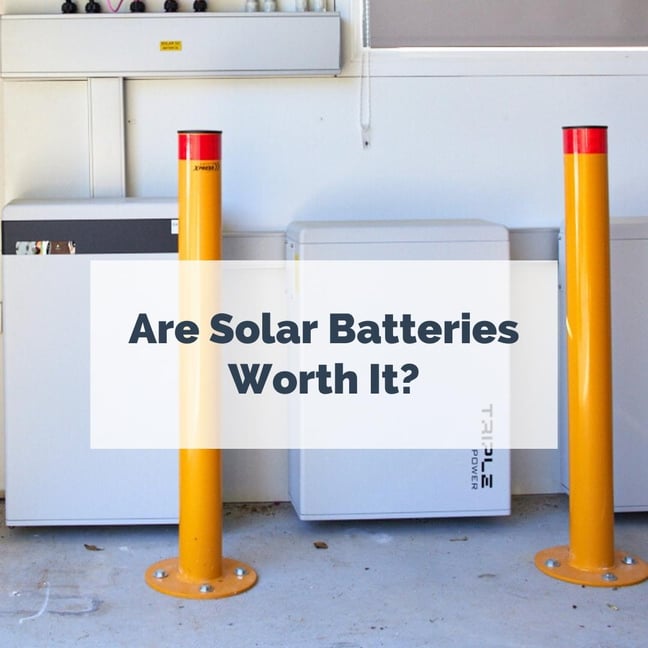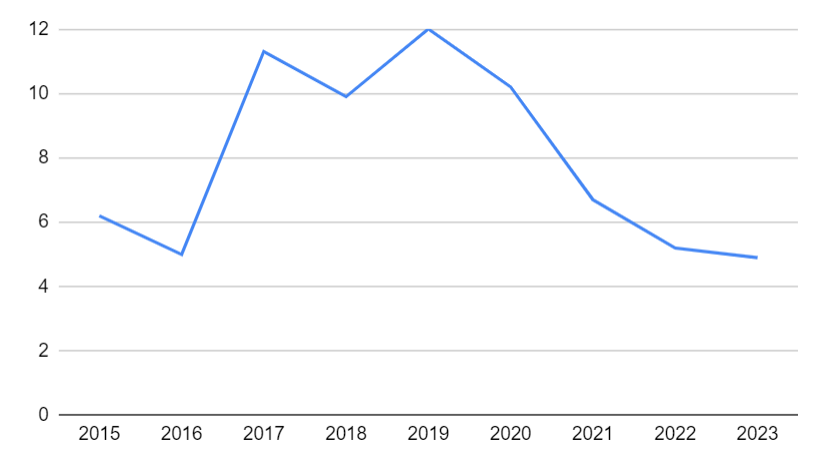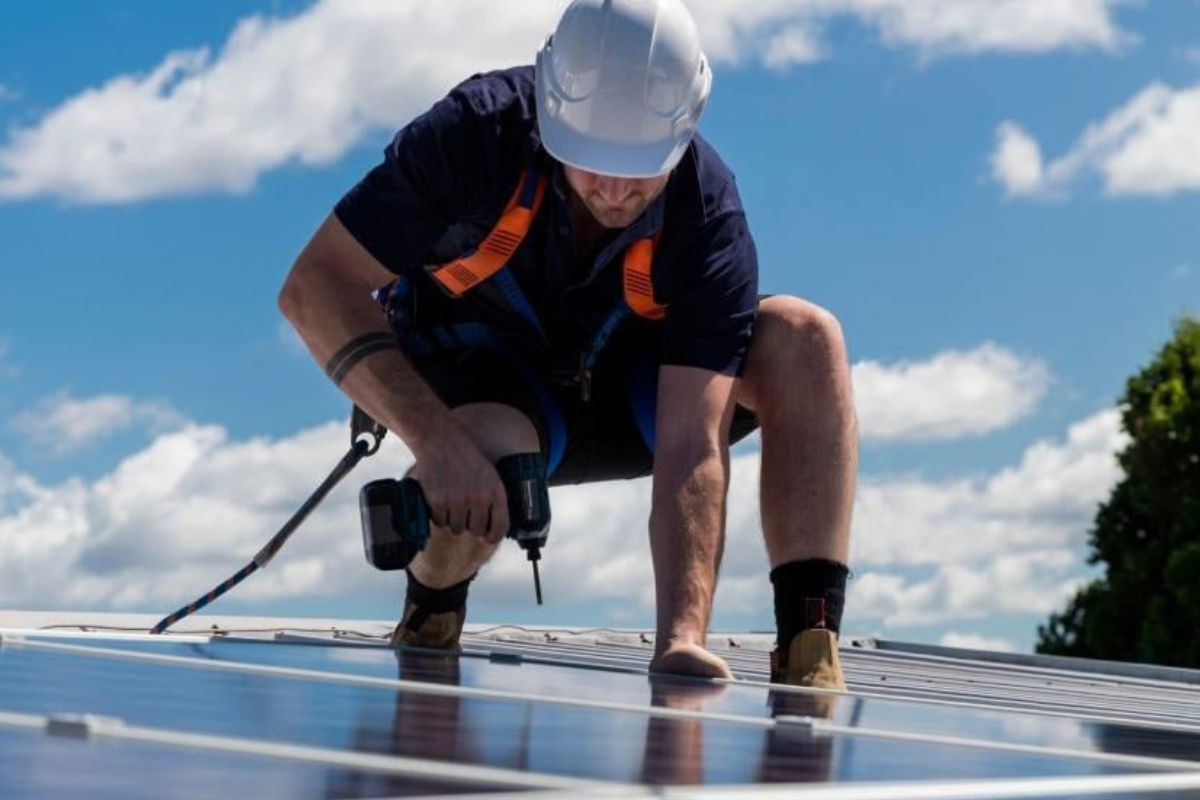Are solar batteries worth it?
Whether you're just looking into solar or already have solar panels installed, the question of whether or not to get solar batteries may have crossed your mind. To frame that more to the point, you may be wondering about the value of being able to store your excess solar energy (which solar batteries enable) rather than selling it to the grid and buying it back later (which is your only option with solar panels alone). The trend for batteries is growing in recent years for one good reason: the value of selling solar energy back to the grid has plummeted as power companies pay less for it, while the value of using your own produced energy skyrockets as electricity prices increase.
But the question remains: are solar batteries worth it?

Let's start with costs
The cost of solar batteries can be significant, and the prices of batteries vary depending on their capacity and technology.
Solar panels alone, without solar battery storage, will cost you anywhere from $4000 - $11,000, depending mostly on kW size. A solar battery will add an additional $8000 to $15,000 on top of that.
If that makes you squirm, it's worth remembering that solar batteries can save you significantly more money over time as well. A small 3kW solar panel system can be easily absorbed financially up-front, especially when you factor in rebates, making it attractive in the short-term. However, they still leave you paying thousands in bills each year which a solar battery would have absorbed.
You can see why the debate has reigned on for so long, and likely why you'll continue to hear differing advice. The fact remains that the choice is yours and situational. Here are some of those situational factors to keep in mind:
1. Can you afford it?
If you can afford a solar battery system today, then the long-term dividends will be well worth it. A solar battery will save you thousands through its ability to drastically reduce or cover your power bill. If you can't, solar panels may be more accessible for you at this time and you may make the conscious choice to opt for them even with the lower return.
2. How much do you pay for electricity in a year?
This can play a pivotal role in your decision-making. If you only pay $500 in electricity bills per year, the value you'll eke out of a battery system is far less than someone currently paying $3500 a year in power bills. For anyone paying $2000 and up in electricity bills per year, there is a good case to start considering the added benefit of battery storage.
With electricity prices soaring between 25-50% in 2023 and showing no signs of slowing over the next decade, your bills are set to only increase across the lifetime of your solar power system.
How much will the typical Australian save on battery storage?
The average household in Victoria or New South Wales could save between $5000 - $40,000 on battery storage across the system's lifetime (around 10 years), as well as thousands in Co2 emissions. Yes, the difference really is that stark - it all depends on what your household size and subsequent power consumption is like. The range varies from small rentals to sizeable family homes.
The best returns will typically be for freestanding homes or sometimes units, with families or heavy power-users. It's also much higher for homes that frequently use large electrical appliances that save on time such as dryers or dishwashers, or homes that have multiple fridges, a heated pool, a spa, or certainly an electric vehicle. With the increase of people working from home, there is also naturally a surge in electrical equipment usage during the day for some homes as we absorb the costs that were once billed to the office.
If this sounds like you, exploring a solar and battery package might be the best thing you ever did.
Will it add to my property value?
Solar with battery power adds significant value to the property they are installed on, which allows you to recoup costs during resale on top of saving on your own electricity supply.
What's the fundamental difference between getting solar panels with or without solar battery storage?
Solar panels on their own are a well-known option for powering homes, but the issue of storage remains. Typical solar panel setups include only the panels and the inverter needed to convert the energy gathered from the sun into a current that can be used on the grid. Neither of these components can store energy, meaning that you only have access to solar power while the sun is shining.
Solar battery storage is the solution to this challenge, allowing homeowners to store excess solar power and use it when there is no sunlight. This has several effects that carry over. For instance, you can cover much more or all of your energy bill, you have access to power at night and in some cases during a blackout, and your reliance on power companies drops off significantly. For those who are environmentally conscious, solar batteries are also the only path to completely decarbonising their home usage.
So who would benefit from solar batteries?
Value-driven buyers
Solar batteries make fantastic long-term financial sense for anyone who can afford them. Due to a higher up-front cost than just solar panels on their own, solar battery purchases have a longer time for return on investment. But that return is often far greater.
The difference in cost between solar panels with or without solar batteries can deter many people who are first looking into solar. The line of thinking may be "why not opt for the cheaper of the two if I save money either way?"
The issue is that solar panels on their own rely on trading your excess energy directly to the grid as there is no means of storing it - in exchange, owners get a small repayment called a feed-in tariff. But here's a graph on what feed-in tariffs have done in Australian over the last decade.

While feed in tariffs used to be a viable way to reduce your electricity bill, that's no longer the case. And feed-in tariffs are only diminishing further, making it impossible to offset your bill with solar panels alone. The new trend is towards 'self-sustainability' - which means there is more value in using your own solar power distributed as needed than there is in selling it back to the grid and needing to buy it back at a higher rate later down the line.
Home electrification enthusiasts
Australians adoption of electrification has been rapid, with many seeking to do more than just eliminate their electricity bill as they know it. Aussies are looking to ditch their petrol bill by moving to electric vehicles, and even transitioning out of gas appliances to electrical ones to save money there as well. A solar battery is the means to fulfilling these ambitions.
What are the different types of solar battery storage?
Solar batteries come in different types, including lithium ion batteries, flow batteries, lead acid batteries, and lithium iron phosphate batteries. The one you'll want is lithium ion, which lasts far longer than its predecessors.
To Sum Up
Installing a solar battery system can help reduce energy costs and increase energy independence. Solar batteries are a valuable addition to any home looking to reduce its carbon emissions and save money on electricity bills. With a good quality solar battery, homeowners can store solar energy and use it during the night, early mornings, darker winters, or during power outages.
However, the decision to invest in a solar battery should be based on individual circumstances, such as your household's typical energy usage, and how much you can afford to invest in your solar system right now.
Homeowners should consult with solar installers or battery manufacturers to determine if solar batteries are worth the investment. Interest-free loans and battery incentives are available to homeowners who want to install solar batteries, making it easier to transition towards renewable energy and reduce their carbon emissions.
FAQ:
Will batteries go down in price?
Ten solar experts will give you ten different answers. The fact remains that no one knows for certain when battery prices will come down and by how much. It's best to evaluate the economic viability of solar batteries as they stand right now.
Does location matter?
The location of the home plays a role in determining how essential solar batteries will be to your solar system. Homeowners in areas with high electricity rates or frequent power outages may benefit more from solar batteries than those in areas with stable power supply and low rates.
How long do solar batteries last?
The lifespan of solar batteries is a significant consideration. While they can last for up to 20 years, the performance of the battery deteriorates over time, reducing its storage capacity. This means the battery's true lifetime will be around 10 years - which aligns with the warranty period on most reputable battery storage. Therefore, homeowners need to factor in the cost of replacement and disposal.
What about a virtual power plant?
Virtual power plants are another solution to the issue of excess energy generated by solar panels. Energy retailers can pay homeowners for the excess power generated by their solar panel system and store it in their virtual power plants. This stored energy can then be used during peak hours to meet the electricity demands of their customers. However, this is another variable you would need to do your research on.
